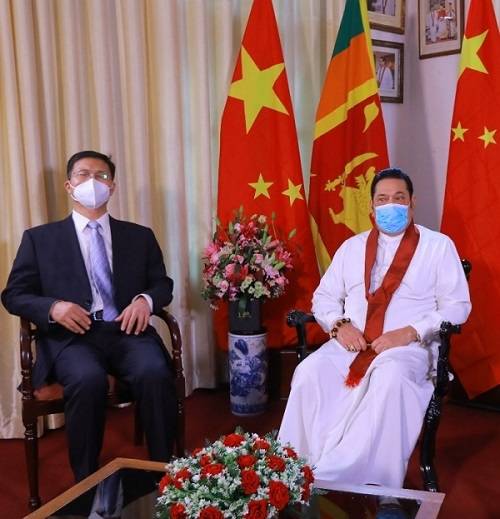A U-turn on the Colombo port’s East Container Terminal and then an attempt to create negativity around the India-supplied Covid-19 vaccine signals that there could be more powerful forces than just mere trade unions and some local groups which are nudging Sri Lanka to adopt an aggressive stand against India right now…reports Ateet Sharma.
Experts believe that Sri Lankan government’s decision to scrap an agreement with India and Japan to jointly run the East Container Terminal in the Lankan capital is a result of persistent external pressure applied by China which has developed high stakes in the country through its expansionist and debt trap Belt and Road Initiative.
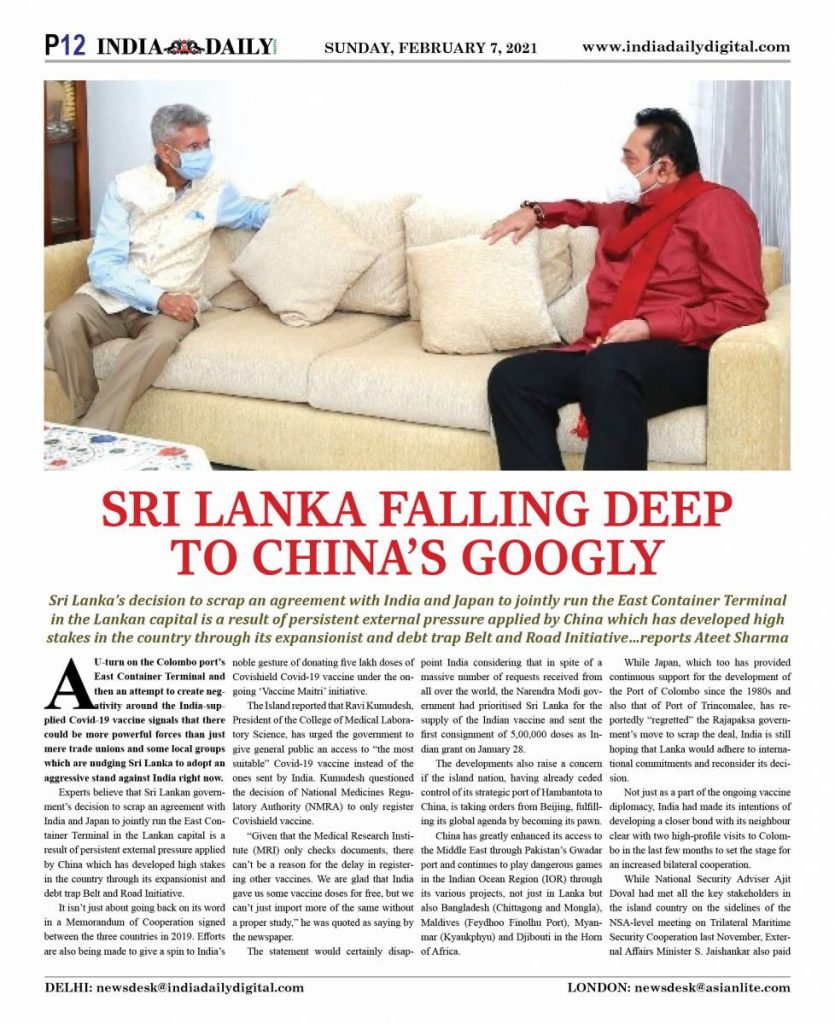
It isn’t just about going back on its word in a Memorandum of Cooperation signed between the three countries in 2019. Efforts are also being made to give a spin to India’s noble gesture of donating five lakh doses of Covishield Covid-19 vaccine under the ongoing ‘Vaccine Maitri’ initiative.
The Island reported that Ravi Kumudesh, President of the College of Medical Laboratory Science, has urged the government to give general public an access to “the most suitable” Covid-19 vaccine instead of the ones sent by India. Kumudesh questioned the decision of National Medicines Regulatory Authority (NMRA) to only register Covishield vaccine.
“Given that the Medical Research Institute (MRI) only checks documents, there can’t be a reason for the delay in registering other vaccines. We are glad that India gave us some vaccine doses for free, but we can’t just import more of the same without a proper study,” he was quoted as saying by the newspaper.
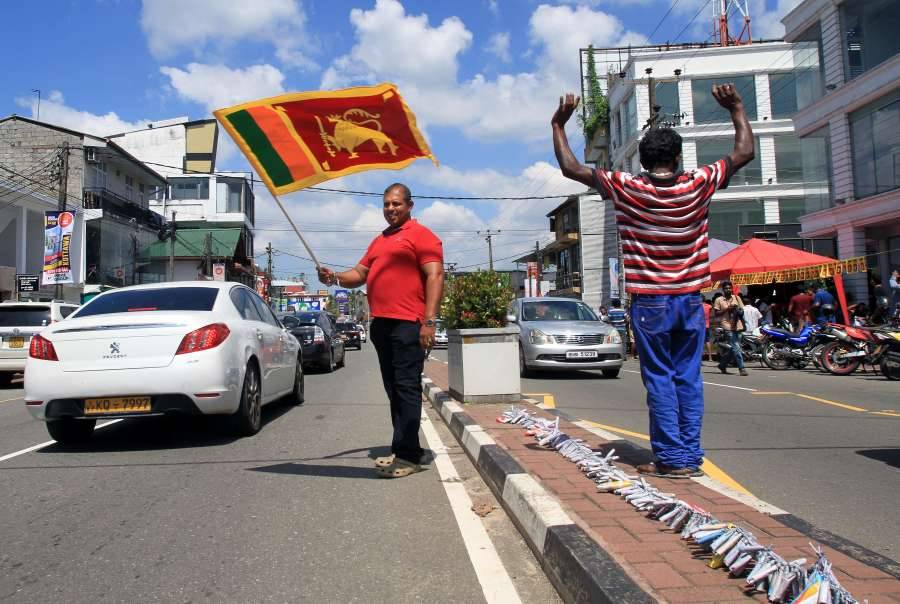
The statement would certainly disappoint India considering that in spite of a massive number of requests received from all over the world, the Narendra Modi government had prioritised Sri Lanka for the supply of the Indian vaccine and sent the first consignment of 5,00,000 doses as Indian grant on January 28.
The developments also raise a concern if the island nation, having already ceded control of its strategic port of Hambantota to China, is taking orders from Beijing, fulfilling its global agenda by becoming its pawn.
China has greatly enhanced its access to the Middle East through Pakistan’s Gwadar port and continues to play dangerous games in the Indian Ocean Region (IOR) through its various projects, not just in Lanka but also Bangladesh (Chittagong and Mongla), Maldives (Feydhoo Finolhu Port), Myanmar (Kyaukphyu) and Djibouti in the Horn of Africa.
While Japan, which too has provided continuous support for the development of the Port of Colombo since the 1980s and also that of Port of Trincomalee, has reportedly “regretted” the Rajapaksa government’s move to scrap the deal, India is still hoping that Lanka would adhere to international commitments and reconsider its decision.
Not just as a part of the ongoing vaccine diplomacy, India had made its intentions of developing a closer bond with its neighbour clear with two high-profile visits to Colombo in the last few months to set the stage for an increased bilateral cooperation.
While National Security Adviser Ajit Doval had met all the key stakeholders in the island country on the sidelines of the NSA-level meeting on Trilateral Maritime Security Cooperation last November, External Affairs Minister S. Jaishankar also paid an official visit to Sri Lanka from January 5-7 January at the invitation of the Foreign Minister of Sri Lanka Dinesh Gunawardena.
Apart from holding talks with his counterpart, Jaishankar also discussed a range of bilateral and regional issues with Lankan President Gotabaya Rajapaksa and Prime Minister Mahinda Rajapaksa.
During his three-day visit, the minister had also made a strong pitch for Tamil reconciliation by meeting the Tamil leadership — delegations of Tamil National Alliance (TNA) and Tamil Progressive Alliance — in Colombo.
Yesterday, in a statement made in Rajya Sabha on the talks held between the two countries, the EAM reiterated that the Government of India has consistently called upon Sri Lanka during bilateral discussions at all levels to fulfill its commitments on addressing the issues related to protecting the interest of Tamils in Sri Lanka.
This, the minister said, was done during the visits of President and Prime Minister of Sri Lanka to India in November 2019 and February 2020 respectively and during the recently held India- Sri Lanka Virtual Bilateral Summit on September 26, 2020 between the two Prime Ministers as also his own visit earlier this month.
“It is in Sri Lanka’s own interest that the expectations of the Tamil people for equality, justice, peace and dignity within a united Sri Lanka are fulfilled. That applies equally to the commitments made by the Sri Lankan Government on meaningful devolution, including the 13th Amendment to the Constitution,” said Jaishankar.
Jaishankar’s statement assumes a great significance in the prevailing circumstances.
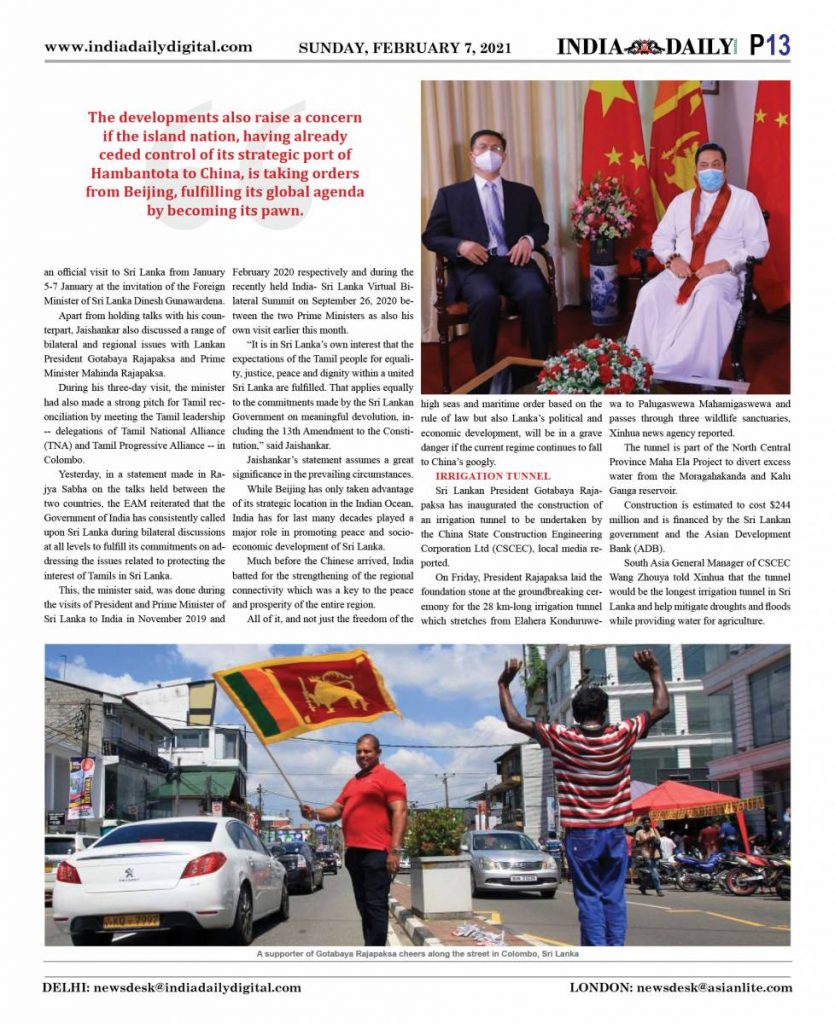
While Beijing has only taken advantage of its strategic location in the Indian Ocean, India has for last many decades played a major role in promoting peace and socio-economic development of Sri Lanka.
Much before the Chinese arrived, India batted for the strengthening of the regional connectivity which was a key to the peace and prosperity of the entire region.
All of it, and not just the freedom of the high seas and maritime order based on the rule of law but also Lanka’s political and economic development, will be in a grave danger if the current regime continues to fall to China’s googly.
Irrigation tunnel
Sri Lankan President Gotabaya Rajapaksa has inaugurated the construction of an irrigation tunnel to be undertaken by the China State Construction Engineering Corporation Ltd (CSCEC), local media reported.
On Friday, President Rajapaksa laid the foundation stone at the groundbreaking ceremony for the 28 km-long irrigation tunnel which stretches from Elahera Konduruwewa to Palugaswewa Mahamigaswewa and passes through three wildlife sanctuaries, Xinhua news agency reported.
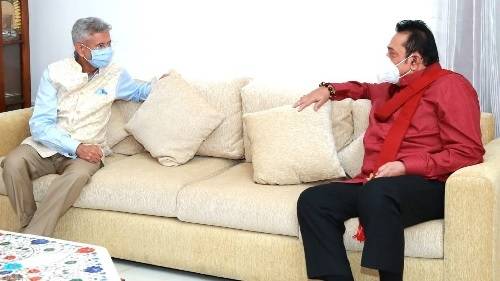
The tunnel is part of the North Central Province Maha Ela Project to divert excess water from the Moragahakanda and Kalu Ganga reservoir.
Construction is estimated to cost $244 million and is financed by the Sri Lankan government and the Asian Development Bank (ADB).
South Asia General Manager of CSCEC Wang Zhouya told Xinhua that the tunnel would be the longest irrigation tunnel in Sri Lanka and help mitigate droughts and floods while providing water for agriculture.
Also Read-Beijing’s plans to browbeat India, US

